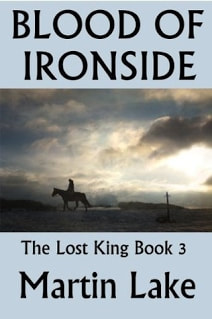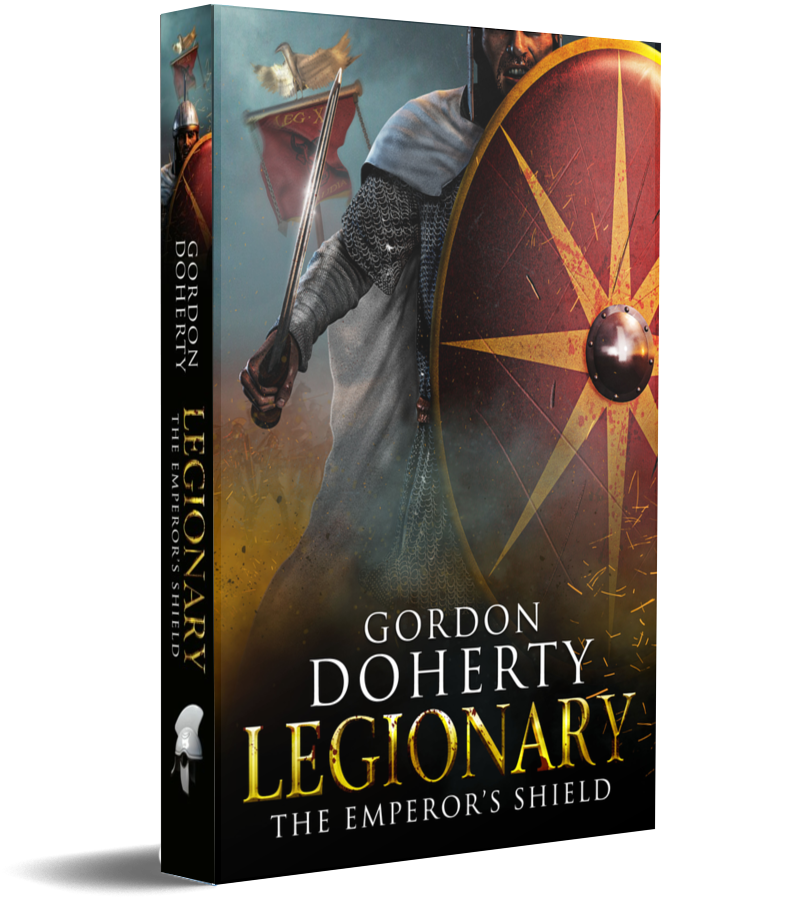|
The last month or so has brought with it a wealth of new historical fiction - and rich pickings for avid readers everywhere! One new work that caught my eye was part 3 of Martin Lake's Norman Trilogy 'Blood of Ironside'. I've had the pleasure of chatting with Martin in the past and was delighted to catch up with him again at his latest launch to chew the fat over his latest opus, histfic and life in general... Gordon: Your back-catalogue is impressive and covers many periods of history, from the Norman Conquest to World War I. What inspires such eclectic historical tastes? Martin: I have always been fascinated by different periods in history, the way in which similar human concerns are acted out in different contexts and situations. Heroes are heroes no matter when they lived; a lover is a lover no matter what their language, beliefs or era. I once sat at a Sound and Light show at the Pyramids and listened to love poems written five thousand years ago. The hairs on the back of my neck tingled as I listened to those voices which were so ancient yet so startlingly modern. It is the same with the historical books I read when I was young. I was a vociferous reader and didn’t much mind whether I was reading about Romans, Vikings, Elizabethans or the Second World War. It was all a treasure trove. Gordon: Do you choose a time period because of your interest in that era or because of the story potential offered by events in that time? Martin: I think it is more because of my interest in that era. The stories come out of that. I never imagined that I would write a series about my protagonist Edgar Atheling and to be honest I knew little about him. I had begun to wonder what the Norman invasion must have meant for the English and as I read more widely Edgar’s name would appear like a shadow on the edge of events. I realised that he would be my ideal protagonist. My interest in the Norman invasion is part of my general fascination with times of change. I imagine there must have been a time in the fifth century when people began to realise they were no longer Romans. Catastrophic events such as wars, invasions and disease dislocate people’s lives (although I guess some remain blithely untouched by it) and this offers a field rich in story. The times which are most difficult to live in are wonderful to read and write about. Gordon: In terms of primary and secondary historical sources, which do you find most useful to fuel your works of fiction? Martin: I read a huge amount of secondary sources, some pretty elderly which I find give me a good overview of the period and more modern works which allow me to burrow down to the finer detail. I also read fiction set in the times I am writing about as this gives me an emotional feel for the times. I am always impressed by people who learn Anglo-Saxon or learn how to fight in a Roman legion, it’s not something I could do. Some primary sources, are essential. For The Lost King series I write with a copy of the Anglo-Saxon chronicle close by and easy access to the PASE Domesday data base. I also make a great deal of use of maps, both ancient and modern. For my book Artful I read diaries of the early settlers of Australia and records about the transport fleets. Gordon: Which of your characters would you most like to meet? I'm guessing there are autobiographical elements to some of them? Martin: This is a tricky one. And you’re right, there are some autobiographical elements in my protagonists. I’d like to meet all of them, of course, but it’s often other characters who I’d like to spend some time with. Godwin, Edgar’s friend is one but also Esbjorn because he appalls me and Matthew in Outcasts because of all he has suffered. Most of all I’d like to meet Anna in The Lost King series and Agnes in Outcasts. I admire them and am fascinated by them. Gordon: Blood of Ironside is the third part of your much-enjoyed Norman trilogy. It must be satisfying to have reached such a milestone. Tell us a little bit about the series and the new book.
Martin: The series starts in the week after the Battle of Hastings. Edgar, the young heir to the throne whose claim had been ignored in favour of Harold Godwinson. Now, with the Normans advancing on London he is proclaimed King. A difficult time for a thirteen year old. The series tells about Edgar’s lengthy struggle to fight William for the throne and how he develops and grows as the calamities mount. Gordon: Tell me about yourself. What do you do outside of your writing? Martin: My wife and I moved to the south of France eighteen months ago so getting used to a new culture is a pretty engrossing task. I’m learning French, learning about the French and Italian take on life, and having fun exploring the area and the history. There are some little villages close by where you feel transported to Medieval times. Gordon: And finally, for aspiring writers out there . . . if you could give just one line of advice, what would it be? Martin: Find an idea which you love, then sit down and keep on writing without agonising over it, until you’ve finished. Thanks for chatting, Martin! You can find Martin’s books at his website.
0 Comments
Leave a Reply. |
AuthorGordon Doherty: writer, history fan, explorer. My Latest BookArchives
March 2023
Categories |




 RSS Feed
RSS Feed